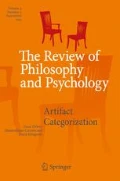Abstract
It has long been known that scientists have a tendency to conduct experiments in a way that brings about the expected outcome. Here, we provide the first direct demonstration of this type of experimenter bias in experimental philosophy. Opposed to previously discovered types of experimenter bias mediated by face-to-face interactions between experimenters and participants, here we show that experimenters also have a tendency to create stimuli in a way that brings about expected outcomes. We randomly assigned undergraduate experimenters to receive two different hypotheses about folk intuitions of consciousness, and then asked them to design experiments based on their hypothesis. Specifically, experimenters generated sentences ascribing intentional and phenomenal mental states to groups, which were later rated by online participants for naturalness. We found a significant interaction between experimenter hypothesis and participant ratings indicating a general tendency for experimenters to obtain the result that they expected. These results indicate that experimenter bias is a real problem in experimental philosophy since the methods and design employed here mirror the predominant survey methods of the field as a whole. The bearing of the current results on Knobe and Prinz’s (Phenomenology and Cognitive Science 7(1):67–83, 2008) group mind hypothesis is discussed, and new methods for avoiding experimenter bias are proposed.
Similar content being viewed by others
Notes
This is true across many domains in the natural sciences, but we will limit the discussion here to empirical psychology.
Thanks to an anonymous reviewer for this point.
References
Adair, J.G., and J.S. Epstein. 1968. Verbal cues in the mediation of experimenter bias. Psychological Reports 22: 1045–1053.
Arico, A. 2007. Deregulating corporate consciousness: A critique of Knobe and Prinz’s intuitions about consciousness. Toronto: Poster presented at the Society for Philosophy and Psychology.
Barber, T.X., and M.J. Silver. 1968. Pitfalls in data analysis and interpretation: a reply to Rosenthal. Psychological Bulletin 70: 48–62.
Cullen, S. 2010. Survey-driven romanticism. Review of Philosophy and Psychology 1: 275–96.
Cushman, F.A., L. Young, and M.D. Hauser. 2006. The role of reasoning and intuition in moral judgments: testing three principles of harm. Psychological Science 17(12): 1082–1089.
Dickersin, K. 1990. The existence of publication bias and risk factors for its occurrence. Journal of the American Medical Association 263: 1385–9.
Doyen, S., O. Klein, C. Pichon, and A. Cleeremans. 2012. Behavioral priming: it is all in the brain, but whose brain? PLoS One 7(1): e29081.
Feltz, A., E.T. Cokely, and T. Thomas Nadelhoffer. 2009. Natural compatibilism versus natural incompatibilism: back to the drawing board. Mind and Language 24(1): 1–23.
Feltz, A., Harris, M., and Perez, A. (2012). Perspective in intentional action attribution. Philosophical Psychology.
Hamlin, J., K. Wynn, and P. Bloom. 2007. Social evaluation by preverbal infants. Nature 450: 557–559.
Ioannidis, J.P.A. 2005. Why most published research findings are false. Public Library of Science, Medicine 2: e124.
Khemlani, S.S., A.B. Sussman, and D.M. Oppenheimer. 2011. Harry Potter and the sorcerer’s scope: latent scope biases in explanatory reasoning. Memory & Cognition 39(1).
Knobe, J. 2003. Intentional action and side effects in ordinary language. Analysis 63: 190–193.
Knobe, J., and J. Prinz. 2008. Intuitions about consciousness: experimental studies. Phenomenology and Cognitive Science 7(1): 67–83.
Knobe, J., Buckwalter, W., Nichols, S., Robbins, P., Sarkissian, H., and Sommers, T. (2011). Experimental philosophy. Annual Review of Psychology, 63.
Monroe, A.E., and B.F. Malle. 2010. From uncaused will to conscious choice: the need to study, not speculate about people’s folk concept of free will. Review of Philosophy and Psychology 1(2): 211–224.
Phelan M., Arico A., and Nichols S. (2012). Thinking things and feeling things: On an alleged discontinuity in folk metaphysics of mind.
Rosenthal, R. 1979. The “file drawer problem” and tolerance for null results. Psychological Bulletin 86: 638–641.
Rosenthal, R., and K. Fode. 1963. The effect of experimenter bias on performance of the albino rat. Behavioral Science 8: 183–189.
Rosenthal, R., and I. Jacobson. 1968. Pygmalion in the classroom. New York: Holt, Rinehart and Winston.
Rosenthal, R., and D.B. Rubin. 1978. Interpersonal expectancy effects: the first 345 studies. The Behavioral and Brain Sciences 3: 377–386.
Scholl, B.J. 2008. Two kinds of experimental philosophy, and their methodological dangers. Talk given at the SPP Workshop on Experimental Philosophy. Philadelphia: University of Pennsylvania.
Strickland, B., M. Fisher, and J. Knobe. 2012. Moral structure falls out of general event structure. Psychological Inquiry 23(2): 198–205.
Sytsma, J., and E. Machery. 2009. How to study folk intuitions about phenomenal consciousness. Philosophical Psychology 22: 21–35.
Young, L., and J. Phillips. 2011. The paradox of moral focus. Cognition 119: 166–178.
Acknowledgments
We would like to thank Joshua Knobe, Chaz Firestone, Alex Shaw, Brandon Liverence, Hugo Mercier and Brian Scholl for useful comments and feedback. We would also like to thank Julie Van Dyke and Laurie Santos for help finding experimenters. Finally, we thank the Yale undergraduate experimenters for designing the experiments.
Author information
Authors and Affiliations
Corresponding author
Rights and permissions
About this article
Cite this article
Strickland, B., Suben, A. Experimenter Philosophy: the Problem of Experimenter Bias in Experimental Philosophy. Rev.Phil.Psych. 3, 457–467 (2012). https://doi.org/10.1007/s13164-012-0100-9
Published:
Issue Date:
DOI: https://doi.org/10.1007/s13164-012-0100-9




